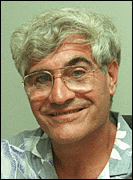

![]()
Pacific Horizons


![]()
Pacific Horizons
PRESIDENT George W. Bush, in an attempt to defuse tensions with Beijing after his assertion that America would do "whatever it takes" to help Taiwan defend itself, felt it necessary to remind Taipei that the United States would not support attempts by either side to change the status quo. [PACIFIC HORIZONS]
Taiwan is likely to remain free as long as it doesn’t say so
His "no declaration of independence" caveat is critically important to Beijing, which remains suspicious that "independence" is Taiwan President Chen Shui-bian's (and perhaps America's) true objective.
Beijing's fears seem unwarranted, at least in the near term. In my meetings with officials and scholars in Taiwan last week, I met no one who thought a declaration of independence was a viable option for Taiwan.
President Chen has stated there would be no declaration of independence as long as the China did not attempt forcibly to unite Taiwan with the mainland. While a referendum was on the ruling Democratic Progressive Party's agenda when it was in the opposition, President Chen has dropped this idea as one of many (thus far unanswered) peaceful gestures toward Beijing.
IN REALITY, WERE a referendum to be held today, it is expected that fewer than 10 to 15 percent of the population in Taiwan would vote for an immediate declaration of independence. Moreover, this is probably double or triple the number who would vote for unification with the mainland now or in the foreseeable future. The overwhelming majority would prefer to maintain the status quo, primarily because they are concerned that an open declaration of independence would create chaos if not outright war across the Taiwan Strait, a confrontation that no one, including Washington, wants.
The dilemma for Beijing is that, as each year passes, fewer and fewer Taiwanese support unification with China, as the old generation of displaced mainlanders fades from the scene and are replaced with a population that sees itself as Taiwanese. They are Chinese-Taiwanese in the same sense that I am an Italian-American. They may take pride in their ethnic roots but they take even greater pride in their Taiwanese identity and in their economic and political accomplishments.
The primary motivation for not seeking formal independence is a very real fear of the consequences. Beijing understands this, which is why it refuses to relinquish the option to use force and continues periodically to rattle sabers in Taiwan's direction. The more Beijing sticks to its belligerent stance, however, the less incentive there is for Taiwanese to seek a closer association with the mainland.
AS ONE TAIWANESE put it, "if China was really sincere in wanting to embrace Taiwan toward the 'motherland,' it would not be threatening it's long lost son with military action if he does not come home now."
Taiwanese argue that Beijing should treat unification like "a future marriage in the works;" one that requires a "proper engagement period" to establish a new relationship based on mutual trust. For the two sides to unite, China must first embrace democracy, which implies a very long engagement.
In the meantime, both sides should show more flexibility in seeking a common ground. President Chen has said he would accept a "one China, differing definitions" formula and Chinese Vice Premier Qian Qichen has talked about "Taiwan and the mainland being part of one China," although Qian's one China is still centered in Beijing.
WHAT IS NEEDED is a type of "one nation, two states" or "commonwealth" formula under which Taiwan and the Peoples Republic of China are seen as parts of a greater China. Such an arrangement does not seem likely under the current leadership in Beijing, but is not impossible over time.
Until then, the people of Taiwan should take some comfort in the realization that Taiwan is already a fully independent state and is likely to remain so...as long as it doesn't declare itself to be one.
Ralph A. Cossa is president of the Pacific Forum CSIS,
a nonprofit research institute in Honolulu.